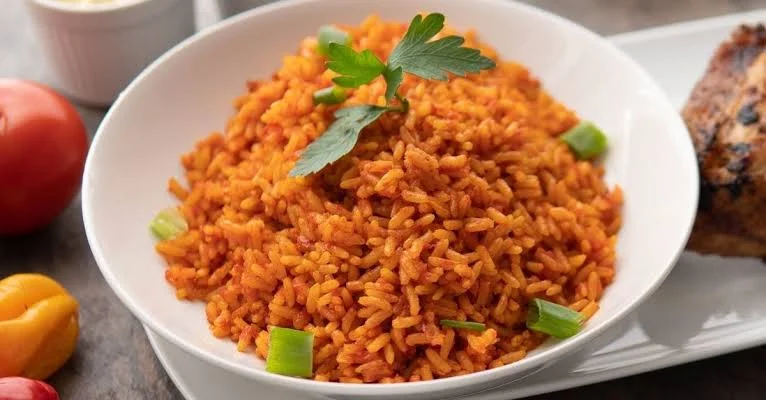Dspite the economy situations of Nigeria, Food is a one commodity that can never be added to opportunity cost. Food commodities are extremely important for human consumption. Thus, a continuous supply of commodities such as grains, dairy products, meat, eggs, sugar, fruits and vegetables are required to meet the current demand of an increasing world population.
In Nigeria, there are several varieties of Food consumed. However, among these many Foods, only few of them are being consumed excessively everyday, anywhere and everywhere in Nigeria. That’s to say, almost every households consume these Foods daily.
Nigeria, a home for over 226 million people, has become the largest market for these Foods in Africa. Infact, the ones that are not locally produce in the country will be shipped in from countries like India and China. The most consumed Foods in Nigeria are:
Rice
Rice is the most commonly eaten Food in Nigeria. The food is eatable for all Nigerians regardless of her tribes and ethnics. Not only Nigerians eat Rice, it’s also the primary staple food for more than half the world’s population, and Asia, Sub-Saharan Africa, and South America are the largest consuming regions.
Rice is a grain food which can be cooked and eaten in different ways and styles by Nigerians. Nigerian Jollof Rice is the most popular and the most delicious among the two competitive countries – Ghana and Cameroon. Nigerian Jollof Rice is also widely accepted as intercontinental food in any part of the world.
In contexts, rice production in Nigeria as of 2023 was about 5.2 million metric tons, while the country’s average annual rice import amounted to 1.5 million metric tons. However, a report by the USDA suggests that Nigeria’s rice import in 2024 could increase to 2.1 million metric tons, potentially making it the world’s largest rice importer.
Cassava
Cassava is another most consumed Foods in Nigeria. 99.99% of Nigerians eat Foods made of Cassava. It is the Nigerian most important staple food in terms of per capita calories consumed. It ranks very high among tuber crops that convert the greatest amount of energy into soluble carbohydrate per unit of area. If processed, you can derives different varieties of Foods from it. Here are Foods that’s derived from Cassava and at the same time be the most consumed Starchy Foods in Nigeria.
Garri
Garri is a very popular starchy Food in every area of Nigeria. It is the most consumed cassava-derived product in west Africa and many other Sub-Sahara African (SSA) countries. In southern part of Nigeria, people love to eat Garri using chilled water and fry fish. Many can also let groundnut go for it. In essence, Garri is widely eaten in Nigeria regardless of tribes or ethnic groups.
Fufu
Fufu is another starchy food in Nigeria gotten from Cassava. In the south-east part of Nigeria, they usually refer to it as Akpu. The southern west people call it Fufu. However, the northern part don’t really fancy eating it. This food usually goes well with Egusi soup, Vegetable and Okra Soup. If you’re not a Nigerian, anytime you have the privilege to visit Nigeria, try to eat FUFU; it’s a special and delicious delicacy.
Meat
Meat is another most consumed Foods in Nigeria. The proteinous food is widely eaten in Nigeria because some people will not be able to consume a meal if meat is not present. It is not a disease or illness, it’s just an added culture in a Nigerian household.
Meat, most especially beef; cow meat, are largely consumed by Nigerians. As a lucrative food business in Nigeria, without meat, consumer will not return to purchase in some another time. In a nutshell, Meat is one of the staple foods best for dinner in Nigeria.
Fish
Fish is another proteinous food that is widely consumed in Nigeria. Fish is valued for its affordability and health benefits, particularly for individuals with health concerns and the elderly. Nigeria boasts the largest fish market in Africa due to this demand.
In contexts, despite consuming approximately 3.6 million metric tons annually, domestic production falls short at 1.2 million metric tons, resulting in a significant import deficit of 2.4 million metric tons, with an import bill of $1.2 billion as of 2022.
Only a portion of the local production, around 440,187 metric tons, is sourced from aquaculture, while the remainder comes from fisheries, totaling about 759,828 metric tons.
However, there has been a notable increase in local production from 1.07 million metric tons in 2021 to 1.2 million metric tons in 2022, paralleled by a rise in consumption from 2.97 million metric tons to 3.6 million metric tons during the same period. With consumption projected to continue rising annually, fish farming presents itself as a lucrative venture in Nigeria.

